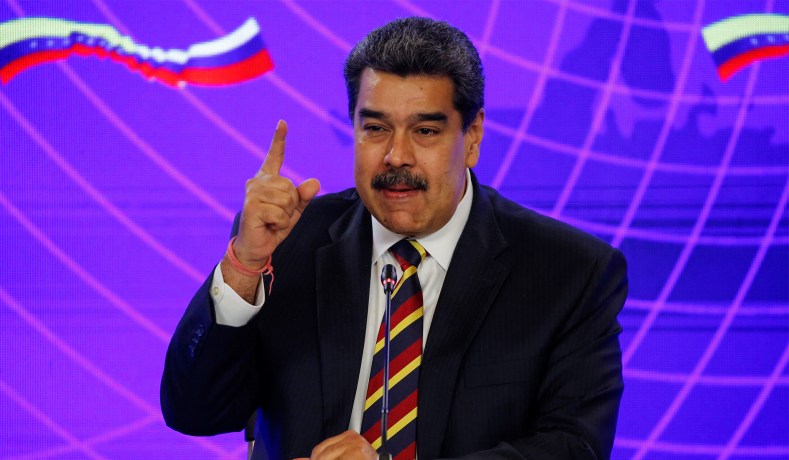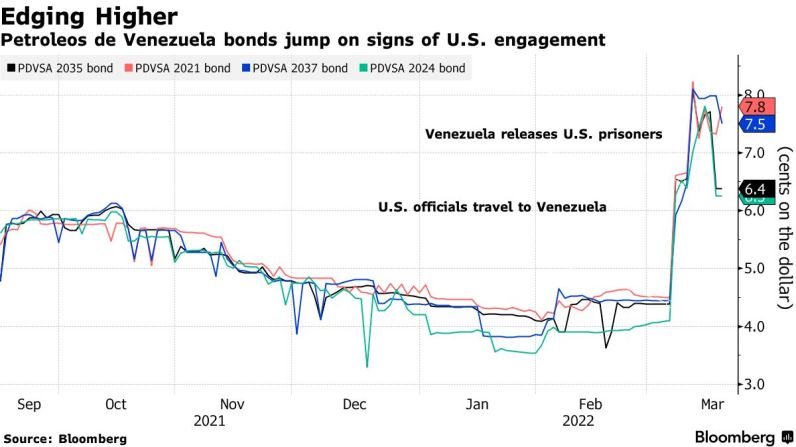
On Friday, Bloomberg reported a rise in Venezuela’s bond prices after news of a meeting on March 5 between the Biden administration and the Maduro government became public:
. . . Venezuela’s bonds due in 2027 rose to about 9.4 cents on the dollar from 6 cents while PDVSA’s 2022 notes now trade around 7 cents from 4 cents before the meeting, according to data compiled by Bloomberg. Interest and activity have picked up since the trip, according to traders and brokers familiar with the transactions who aren’t authorized to speak publicly.
While U.S. investors are prohibited from buying Venezuelan bonds per 2019 sanctions on the Maduro regime, European investors have started betting on an impending oil deal between Washington and Caracas.

Daniel DiMartino, a Venezuelan freedom activist and economics Ph.D. candidate, told National Review that the rise in bond prices is “a clear signal that investors expect the Biden administration to lift some sanctions.” Even that expectation is “allowing the Venezuelan socialist regime to profit by reducing the costs of borrowing in international markets.” As oil prices rise due to the conflict in Ukraine, the Biden administration was reportedly discussing sanction waivers for Venezuelan oil production.
The Biden administration will provide sanctions relief if the Venezuelan government follows “concrete steps,” according to national-security adviser Jake Sullivan. The first of those steps seems to be the release of two American hostages, which occurred a few days after the meeting in Caracas.
The White House has drawn sharp criticism for its discussions with Venezuelan leaders. Under Biden, Washington has shown little support for the U.S.-recognized opposition led by Juan Guaidó. The U.S. does not recognize the authoritarian Maduro regime and has remained largely quiet on Maduro’s rogue behavior. Indeed, it has largely overlooked illegal, U.S.-sanctioned oil trade between Iran and Venezuela and has sat back while Russia and the Maduro regime have grown closer. In August, for instance, the Biden administration passed up the opportunity to negotiate on the side of the opposition while Russia represented Maduro. Elliott Abrams wrote:
The Biden administration actually gave what used to be called the “Arab no.” It never gave a flat rejection, but hemmed and hawed to get the opposition to look elsewhere.
As a result, Russia will be sitting with the regime, and the Netherlands will be sitting with the opposition.
Another major criticism is the Biden administration’s willingness to court adversaries for oil after discouraging domestic-energy production:
Joe Biden using #Russia as an excuse to do the deal they always wanted to do anyway with the #MaduroRegime
Rather than produce more American oil he wants to replace the oil we buy from one murderous dictator with oil from another murderous dictatorhttps://t.co/HA7X71r2Mn
— Marco Rubio (@marcorubio) March 6, 2022
Even so, as oil prices remain high and the Biden administration fails at securing more oil from the Saudis and Emirates, the White House is still willing to court Maduro (again, instead of encouraging domestic drilling).
Earlier today, the Wall Street Journal reported that the Biden administration “is listening closely to Chevron” as it calls on the Washington to ease restrictions on Venezuelan oil. This comes after months of Biden administration officials waving off Chevron lobbyists.
President Biden seems to have no problem lining the pockets of a socialist dictator as long as he can lower the price at the pump.
